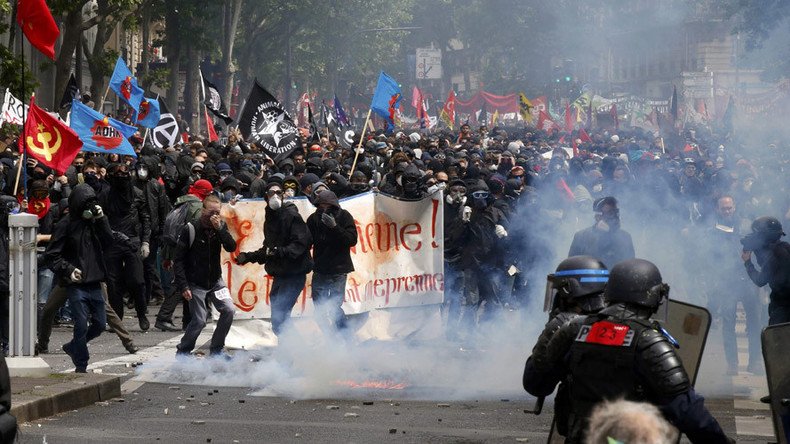France gives green light to anti-labor law demo, but with restrictions

French unions have received the right to continue protests against a highly unpopular labor law that has sparked mass rallies across the country in recent months. However, authorities said demonstrators must follow a designated route of less than 1.6km.
"After intensive discussions with the interior minister [Bernard Cazeneuve], trade unions and youth [movements] were given the right to demonstrate in Paris [June 23] on a route offered by the interior minister,” the head of the General Confederation [CGT] union, Philippe Martinez, said at a press conference.
He added that the unions also received permission to demonstrate on June 28.
Le parcours de la manif de demain, un peu dubitatif que les syndicats aient accepté ça #LoiTravailpic.twitter.com/O6ClXVlhhg
— Meriadeck (@Meriadeck) June 22, 2016
According to Martinez, the authorities’ decision to allow the protest was “a victory for democracy.”
However, France introduced restrictions for the demonstrators in Paris – the participants have to follow a designated route from the Place de la Bastille square to the Port de l'Arsenal and back. The whole route will be about 1.6km, French media reported, citing trade unions.
The labor unions, however, did not comment on the organization of the anti-labor law protests in other French cities.
READ MORE: Chaos, uncertainty & anger: 5 ways anti-labor reform protests disrupt life in France
French authorities have repeatedly called to ban the demonstrations against labor reforms or at least to make them more “static.” Interior Minister Bernard Cazeneuve said on Tuesday that the French government is seeking to ensure that protests do not pose the risk of violence. “The police are tired and need some recovery time,” he added.
BREAKING: At least 40 injured, 58 arrested in #Paris anti-labor reform protests – police https://t.co/vXbT3BXzWjpic.twitter.com/CLCe3uPSct
— RT (@RT_com) June 14, 2016
Law enforcement authorities had released a statement on Wednesday saying that the Prefect of Police “believes he has no choice but to ban the demonstration.”
"After close examination, these alternative proposals address neither the security needs of people and property, nor the demands on police resources given the terrorist threat," a police department statement said.
Tear gas & Fires: Police clash with anti-labor reform protesters in France (PHOTOS, VIDEO) https://t.co/Wh3dJM4YzZpic.twitter.com/j5URfErGk1
— RT (@RT_com) April 28, 2016
The police attempt to ban the protests was highly criticized by a number of French politicians. According to the president of the National Front, Marine Le Pen, banning the demonstrations is “a serious attack on democracy.”
MP from the French National Assembly, Christian Paul, called the ban a "historic error" while Guillaume Balas from the Socialist Party said “the government must ensure security and freedom to protest.”
‘Public hatred’: Police car smashed & set on fire during Paris protest https://t.co/TpoGEoL8LWpic.twitter.com/oAnOCWV0B5
— RT (@RT_com) May 19, 2016
The protests, launched in March this year and held under the popular slogans LoiTravail (Labor Law) and NuitDebout (Rise Up At Night), have repeatedly turned violent, with officers clashing with demonstrators and police firing tear gas. Almost every rally has ended with arrests. The most violent rallies occurred in Paris, Rennes and Nantes.
The demonstrators often showed their disrespect for officers, shouting “Everyone hates police” during rallies. The slogan has become popular and was seen on banners and as a hashtag in Facebook groups. Other insulting slogans against the police included: “Police everywhere, justice nowhere,” and “Cops, murderers.”
Paris police car set ablaze as officers protest brutality against them (VIDEOS, PHOTOS)https://t.co/TpoGEp2JDupic.twitter.com/j6jemXU6k3
— RT (@RT_com) May 18, 2016
Police even decided to stage an anti-brutality rally against their ranks during massive anti-labor reform protests in May. Law enforcement officers said they have been unfairly treated by the public for simply trying to do their job. However, the protest didn’t seem to affect anti-labor reform demonstrators – a police car was torched during the rally.
The unpopular reform, initiated by Labor Minister Myriam El Khomri, forces employers to pay only 10 percent of overtime bonus, instead of the current 25 percent. The bill technically maintains the 35-hour working week, but says that in case of “exceptional circumstances,” employees can be asked to work up to 60 hours a week.
Sporadic anti-labor reform protests in France have grown into something more substantial – now people claim they are rallying against capitalism, French government policies and intolerance. The protests’ slogans seem very similar to the Occupy movement, which started in the US in 2011 and spread globally.












